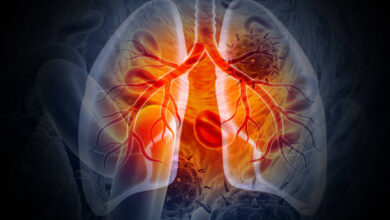Effective Methods for Relieving Mucus and Chest Congestion
Effective Methods for Relieving Mucus and Chest Congestion

Chest congestion occurs when an individual has an excessive amount of phlegm in their chest, which is difficult to expel even with persistent coughing efforts.1 One can alleviate this issue by employing home remedies such as steam therapy, consuming soups, and using specific medications.
These remedies, among others, can provide relief from chest congestion. Nevertheless, it is essential to acknowledge that they do not serve as cures for the underlying infection responsible for the production of chest mucus.
Mucus serves to form a protective lining in specific body parts, even under normal health conditions. It prevents these areas from drying out and aids in fending off intruders such as viruses and bacteria.
Infections, allergies, and smoking are potential contributors to the accumulation of excessive mucus in the body.
Continue reading to discover additional information about home remedies and medications that may provide relief.

Humidifier Use for Alleviating Chest Congestion
Introducing moisture into the air through the use of a humidifier may serve as a beneficial household remedy for chest congestion, according to Health. Although not effective for everyone, it is recommended by Alan Mensch, MD, a pulmonologist and senior vice president of medical affairs at Northwell Health’s Plainview Hospital in Plainview, New York, to explore this option cautiously.
Nonetheless, employing humidifiers safely is paramount. Humidifiers have the potential to foster mold and fungi, leading to the risk of other infections. Hence, it is essential to diligently maintain and clean your humidifier in adherence to the manufacturer’s instructions.
Stay Hydrated
The body requires adequate fluid intake to maintain thin mucus. When dealing with a cold, increasing fluid consumption can help to thin mucus and facilitate sinus drainage.
Staying hydrated may also alleviate congestion for individuals with seasonal allergies.
Posture Adjustment
Remaining upright while awake can alleviate congestion. Moreover, altering sleeping positions can assist in clearing chest mucus. You may consider using pillows to prop yourself up while sleeping, promoting rest and recovery during illness.
Utilize a Warm, Moist Cloth on the Facial Area
When experiencing a throbbing sinus headache, employing a warm, moist washcloth can provide soothing relief. Inhaling through a damp cloth promptly reintroduces moisture to the nose and throat, while the heat aids in alleviating discomfort and pressure.
Manage Coughing
Taking control of your coughing may help alleviate congestion by assisting in the removal of mucus from the airways. When possible, exerting more influence over your cough can aid in loosening and expelling mucus from your respiratory passages.

Broth-based Soup
Enjoying warm soups, such as chicken soup, may offer relief from chest congestion, although it does not serve as a cure for conditions like the common cold. Soup provides two advantages, the first being the decongestant effect of its steam.
Benefits of a Warm Shower
Taking a hot shower can provide various benefits for your respiratory system. Another option is to create steam by running hot water in your sink and covering your head and the faucet with a towel, allowing you to breathe in the warm vapor. According to Dr. Alice Hoyt of the Hoyt Institute of Food Allergy, this steam can help open up the airways and facilitate the removal of mucus, providing relief.
Utilize Saline Nasal Solutions
Using a saline nasal spray or irrigation system can effectively clear mucus and allergens from the nasal passages and sinuses. Opt for sterile sprays containing only sodium chloride, and ensure you use sterile or distilled water for rinsing purposes.
Effective Methods for Phlegm Relief
When phlegm moves from the lungs to the throat, it’s a natural response for the body to expel it. Draining it by spitting is healthier than swallowing.
Honey
For additional relief, consider incorporating honey into a warm beverage such as tea to further alleviate chest congestion. Researchers have observed that honey contains nutrients that can enhance the immune system. When combined with warm water, honey has the ability to dissolve phlegm in the respiratory tract and alleviate coughing.
It’s important to note that honey should not be given to children under the age of one, as doing so increases the risk of botulism, a toxin-induced illness that affects the body’s nervous system.
Gargle with Salt Water
Saltwater has the potential to soothe an inflamed throat and aid in the clearance of residual mucus. A person can mix one teaspoon of salt into a glass of warm water and gargle several times a day.

Herbal Remedies for Airway Health
Certain herbal products can assist in clearing phlegm from the airways. These products often contain natural ingredients, such as:
-
Eucalyptus
-
Pelargonium
-
Primrose
-
Thyme
Nevertheless, it’s important to note that these products may lead to side effects, such as gastrointestinal issues.
Consider Eucalyptus
Eucalyptus products have been utilized by experts for years to alleviate coughs and reduce mucus. Typically, they are applied directly to the chest. Alternatively, a few drops of eucalyptus oil can be added to a diffuser or a warm bath to help alleviate nasal congestion.
Ensure adequate fruit intake
A diet high in fruit and potentially soy fiber may result in a reduction in respiratory issues linked to phlegm.
Steer clear of acid reflux-triggering foods
Acid reflux can lead to an escalation in phlegm and mucus. Individuals susceptible to heartburn should avoid trigger foods and seek guidance from a healthcare professional for proper management.
To alleviate chest congestion, consider the consumption of hot drinks, use of humidifiers, certain herbal remedies, and medications such as expectorants. If experiencing chest congestion along with symptoms like difficulty breathing and fever, seek advice from a healthcare provider.
Ensure adequate fruit intake
A diet high in fruit and potentially soy fiber may result in a reduction in respiratory issues linked to phlegm.
Steer clear of acid reflux-triggering foods
Acid reflux can lead to an escalation in phlegm and mucus. Individuals susceptible to heartburn should avoid trigger foods and seek guidance from a healthcare professional for proper management.
A Brief Overview
To alleviate chest congestion, consider the consumption of hot drinks, the use of humidifiers, certain herbal remedies, and medications such as expectorants. If experiencing chest congestion along with symptoms like difficulty breathing and fever, seek advice from a healthcare provider.





